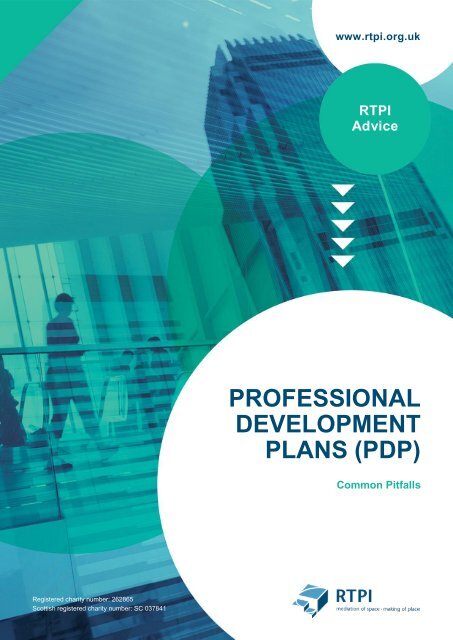PROFESSIONAL DEVELOPMENT PLANS (PDP)
Jajg3020S51
Jajg3020S51
You also want an ePaper? Increase the reach of your titles
YUMPU automatically turns print PDFs into web optimized ePapers that Google loves.
www.rtpi.org.uk<br />
RTPI<br />
Advice<br />
<strong>PROFESSIONAL</strong><br />
<strong>DEVELOPMENT</strong><br />
<strong>PLANS</strong> (<strong>PDP</strong>)<br />
Common Pitfalls<br />
Registered charity number: 262865<br />
Scottish registered charity number: SC 037841
1 RTPI Advice Professional development plans (<strong>PDP</strong>)<br />
Common Pitfalls<br />
Common Pitfalls in Creating <strong>PDP</strong>s<br />
This document is to be used in conjunction with the current guidance for the route<br />
you are applying through, or the current guidance on CPD monitoring. Please visit<br />
the relevant area of the RTPI website to ensure you have the most up-to-date<br />
guidance available to ensure you are complying with current requirements - this is<br />
particularly relevant for membership applications where the <strong>PDP</strong> is assessed<br />
alongside the written submission.<br />
Please see the website www.rtpi.org.uk for more resources around creating<br />
successful <strong>PDP</strong>s as well as the most up-to-date guidance for your circumstances.
2 RTPI Advice Professional development plans (<strong>PDP</strong>)<br />
Common Pitfalls<br />
This document covers the most common reasons why members have been<br />
unsuccessful. It is not exhaustive, it aims to give an idea of what to avoid.<br />
Part 1: SWOT (Strengths, Weaknesses, Opportunities, Threats)<br />
<br />
<br />
Not addressing the majority of the weaknesses in your SWOT.<br />
Not achieving consistency between your SWOT and action plan. For example,<br />
don’t list lots of paid courses in your plan, if you have identified a lack of training<br />
budget as a threat.<br />
Part 2: Goals and Objectives<br />
<br />
<br />
<br />
Goals or objectives focused on processes e.g. ‘gain membership’, ‘complete a<br />
PhD’.<br />
Goals or objectives that are too vague. Don’t state that you want to develop your<br />
‘understanding of different areas of planning’, tell us what areas they are.<br />
Giving actions instead of objectives or goals. Don't state the specifics of what<br />
you will do until you reach action level (see below).<br />
Part 2: Action Plan<br />
<br />
<br />
<br />
<br />
<br />
<br />
<br />
<br />
<br />
Being vague. You must be specific. What, where, why and how is this action<br />
happening? – put this information in the 1 st column of the template.<br />
Not including ways to measure, or test, the development you gain from the action<br />
– put this information in the middle column of the template. Undertaking the<br />
activity is not, in itself, a sign of success.<br />
Not giving targeted timeframes. If an action is ongoing, you must give a date for<br />
review – put this information the 3 rd column of the template.<br />
Not indicating if agreement/approval has been gained for the action.<br />
Not including a backup plan for any unbooked/unagreed actions.<br />
Giving a work plan instead of a personal professional development plan. Don't<br />
tell us what you're doing to improve efficiency in the department, or the steps in a<br />
project, or your day-to-day work.<br />
Including actions which are not continuing professional development (CPD).<br />
Every action must help you develop knowledge and skills e.g. researching<br />
courses to attend or job hunting are not CPD.<br />
Focusing on too many actions. List one CPD activity per line of the template, this<br />
will ensure you can achieve the level of detail required.<br />
Not keeping the actions in a planning context. You can have some non-planning<br />
CPD; project management, public speaking etc., but they must be given in the<br />
context of developing as a planner, and the majority of your actions should focus<br />
on developing your planning knowledge, skills and/or experience (i.e. at least<br />
50%).<br />
General<br />
<br />
<br />
Not covering a 2 year period. It's easy to find lots of actions for the coming few<br />
months but your plan should cover the following 2 years, so look beyond the next<br />
6 months.<br />
Not allowing time to work on the <strong>PDP</strong>. It requires thought and it needs ample time<br />
devoted to it to make sure you get it right.
For more information please visit<br />
www.rtpi.org.uk<br />
This paper was written by<br />
Robin Bates<br />
Professional Development and Membership Officer<br />
RTPI - Royal Town Planning Institute<br />
cpd@rtpi.org.uk<br />
Tel: 020 7929 9494<br />
Royal Town Planning Institute, 41 Botolph Lane, London EC3R 8DL.<br />
Registered Charity in England (262865) & Scotland (SC037841)


